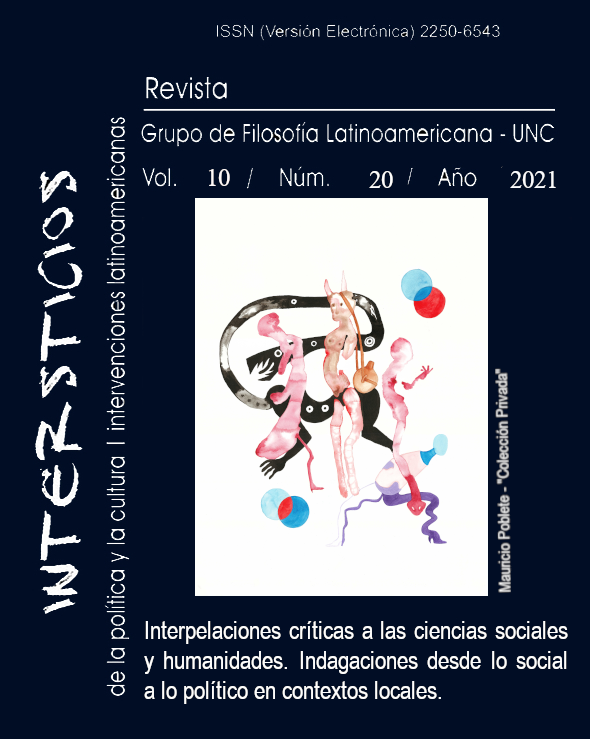About common/community senses. Critical interpellations from epistemic, political and ecological perspectives
Keywords:
Common sense, Epistemic-political, Political imaginationAbstract
The article interweaves the contributions of Arturo Escobar and Boaventura de Sousa Santos, inviting to a reflection on the construction of their epistemic-political perspectives, in order to think our regional and local present, crossed by multiple socio-environmental and socio-territorial movements and resistances. We recover the contributions of these thinkers in the conviction that some of the categories they propose are very fruitful for the understanding of the meanings and scope of social resistances in our conflictive Latin American present. The reflection is based on three axes: the epistemic, the political and the ecological, which we consider intensely intertwined and based on a principle of reality that demands profound counter-hegemonic global transformations.
From Latin American philosophy we critically question the social sciences and humanities as a political epistemic practice that contributes to an emancipatory construction of knowledge from our America, an interpellation that puts us on the road to rethink our modes of knowledge production, our forms of sociability with its symbolic universes, the ways of inhabiting them and the power relations that cross them. All of them are thought, from the contributions of Escobar and Santos, as political practices that may be able to face the advance of hegemonic globalizations. Their theoretical proposals place us on the starting point of a political imagination aimed at working on the displacement of the common sense of the modern West, in order to work on the creation of new common senses, capable of building other perspectives that can overcome the fundamental contradiction between the finitude of nature as an expropriable resource and the infinity of capitalist accumulation.
Downloads
References
Alimonda, H. (2016). Notas sobre la ecología política latinoamericana: arraigo, herencias, diálogos. En: Revista Ecología Política, (51), 36-42. Recuperado de: https://www.ecologiapolitica.info/novaweb2/?p=6017.
Alimonda, H. et al (comp.) (2017). Ecología política latinoamericana. Vol I y II, Buenos Aires: CLACSO.
Castro Gómez, S. (2015). Revoluciones sin sujeto. Slavoj Zizek y la crítica del historicismo posmoderno, México: Ediciones Akal.
Escobar, A. (2010). Territorios de diferencia: lugar, movimientos, vida, redes, Popayán, Colombia: Envión Editores.
Escobar, A. (2012). Cultura y diferencia: la ontología política del campo de Cultura y Desarrollo. En: Wale’keru. Revista de investigación en cultura y desarrollo, (2), 7-16. Recuperado de: https://dugi-doc.udg.edu/bitstream/handle/10256/7724/WALEKERU-Num2-p7-16.pdf?sequence=1.
Escobar, A. (2014). Sentipensar con la tierra. Nuevas lecturas sobre desarrollo, territorio y diferencia, Medellín: Ediciones UNAULA. Recuperado de: http://biblioteca.clacso.edu.ar/Colombia/escposunaula/20170802050253/pdf_460.pdf.
Escobar, A. (2016). Sentipensar con la Tierra: Las Luchas Territoriales y la Dimensión Ontológica de las Epistemologías del Sur. En: Revista de Antropología
Iberoamericana, Vol. 11, (1), 11-32. Recuperado de: http://www.aibr.org/antropologia/netesp/numeros/1101/110102.pdf
Gramaglia, P. (2011). Lo político en Latinoamérica. Movimientos sociales – movimientos políticos. En: Intersticios de la política y la cultura latinoamericana: los movimientos sociales. Britos Castro, A; Gogna, R; Gramaglia, P; Lario, S. (eds). Córdoba: Fac. de Filosofía y Humanidades-UNC.
Laclau, E.; Mouffe, C. (1987), Hegemonía y estrategia socialista. Hacia una radicalización de la democracia, Madrid: Siglo XXI.
Laclau, E. (1996), Emancipación y Diferencia, Buenos Aires: Ariel.
Lander, E. (2000). Ciencias sociales: saberes coloniales y eurocéntricos. En: Lander, E. (comp.) La colonialidad del saber: eurocentrismo y ciencias sociales. Buenos Aires: CLACSO.
Lander, E. (2013). Los límites del planeta y la crisis civilizatoria. En: Contextualizaciones latinoamericanas, Vol. 1, (8), 1-19. Recuperado de: http://contexlatin.cucsh.udg.mx/index.php/CL/article/view/2791/7420.
Leff, E. (2003). La ecología política en América Latina: un campo en construcción. En: Revista Sociedade e Estado, V. 18, (1/2), 17-40. Recuperado de: https://www.scielo.br/j/se/a/xf8jDCswFkPF9zS4s4vyfLP/?lang=es&format=pdf.
Leff, E. (2014), La apuesta por la vida. Imaginación sociológica e imaginarios sociales en los territorios ambientales del sur, México: Siglo XXI.
Liendo, Ma. C. (2016). Saberes migrantes. Sobre el problema de la traducción. En: Liendo, Ma. C.; Fernández P. (comps), Saberes y emancipaciones desde el Sur, Córdoba: Eduvim.
Liendo, Ma. C. (2020). Derechos en disputa: ciencia social y trasformaciones emancipatorias. En: Pensares y Quehaceres. Revista de Políticas de la Filosofía (10), Colombia. Disponible en: https://drive.google.com/file/d/1dsmYcAqA_FPlpVR0ZxKOpBet_0BJreuh/view.
Santos, B. de Sousa (1998). De la mano de Alicia. Lo social y lo político en la posmodernidad. Bogotá: Siglo del Hombre/Uniandes.
Santos, B. de Sousa (2009). Una epistemología del Sur, México-Buenos Aires: Siglo XXI – CLACSO.
Santos, B. de Sousa (2014). Reflexiones para la construcción de un intelectual de retaguardia. Conversaciones con Boaventura de Sousa Santos. En: Estudios del ISHiR, (9), 75-97. Investigaciones Socio Históricas Regionales, Unidad Ejecutora en Red. Recuperado de: https://web3.rosario-conicet.gov.ar/ojs/index.php/revistaISHIR/article/view/355
Santos, B. de Sousa (2021). Descolonizar la Universidad: el desafío de la justicia cognitiva global, Ciudad Autónoma de Buenos Aires: CLACSO.
Svampa, M. (2016). Debates Latinoamericanos. Indianismo, Desarrollo, Dependencia, Populismo, Buenos Aires: Edhasa.
Downloads
Published
Issue
Section
License

This work is licensed under a Creative Commons Attribution-NonCommercial-ShareAlike 4.0 International License.
Authors who have publications with this journal agree to the following terms:
a. Authors will retain their copyright and grant the journal the right of first publication of their work, which will simultaneously be subject to the Creative Commons Attribution License that allows third parties to share the work as long as its author and first publication in this journal are indicated.
b. Authors may adopt other non-exclusive license agreements for distribution of the published version of the work (e.g., deposit it in an institutional telematic archive or publish it in a monographic volume) as long as the initial publication in this journal is indicated.
c. Authors are allowed and encouraged to disseminate their work through the Internet (e.g., in institutional telematic archives or on their web page) after the publication process, which may produce interesting exchanges and increase citations of the published work (see The effect of open access).


